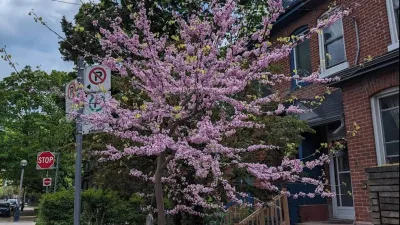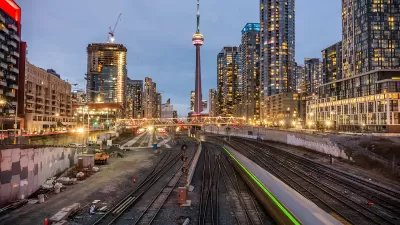While mobile food markets can bring healthy produce to neighborhoods without grocery stores, their current model for driving food around cities is not financially sustainable.
Adele Peters of Fast Co.Exist examines mobile food markets, looking particularly at Mobile Good Food Market, a wheelchair-accessible bus converted into a traveling food stand that brings healthy, fresh food into Toronto's food deserts.
Although it is stocked with fresh fruits and vegetables, the system has a few major shortcomings. For one, the capacity of the bus limits the amount of people who can shop at any given time, inhibiting it from running during the coldest weather. Timing is also a huge factor, as discussed by Debbie Field, the executive director for the organization FoodShare Toronto that runs the bus, "If you're there and you can come for one hour, it's like a needle in a haystack... How do you get there when people are going to be there, so there's enough density, enough people to shop?"
However, Peters writes that the mobile market shows the neighborhood demand, which spurred Toronto residents to start their own community-run markets selling produce bought from FoodShare Toronto. These are generally more successful, as they can be open for several hours a day.
FULL STORY: Why Mobile Markets Aren't Going To Solve The Problem Of Food Deserts

Planetizen Federal Action Tracker
A weekly monitor of how Trump’s orders and actions are impacting planners and planning in America.

San Francisco's School District Spent $105M To Build Affordable Housing for Teachers — And That's Just the Beginning
SFUSD joins a growing list of school districts using their land holdings to address housing affordability challenges faced by their own employees.

The Tiny, Adorable $7,000 Car Turning Japan Onto EVs
The single seat Mibot charges from a regular plug as quickly as an iPad, and is about half the price of an average EV.

With Protected Lanes, 460% More People Commute by Bike
For those needing more ammo, more data proving what we already knew is here.

In More Metros Than You’d Think, Suburbs are Now More Expensive Than the City
If you're moving to the burbs to save on square footage, data shows you should think again.

The States Losing Rural Delivery Rooms at an Alarming Pace
In some states, as few as 9% of rural hospitals still deliver babies. As a result, rising pre-term births, no adequate pre-term care and "harrowing" close calls are a growing reality.
Urban Design for Planners 1: Software Tools
This six-course series explores essential urban design concepts using open source software and equips planners with the tools they need to participate fully in the urban design process.
Planning for Universal Design
Learn the tools for implementing Universal Design in planning regulations.
Smith Gee Studio
City of Charlotte
City of Camden Redevelopment Agency
City of Astoria
Transportation Research & Education Center (TREC) at Portland State University
US High Speed Rail Association
City of Camden Redevelopment Agency
Municipality of Princeton (NJ)





























